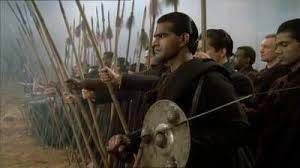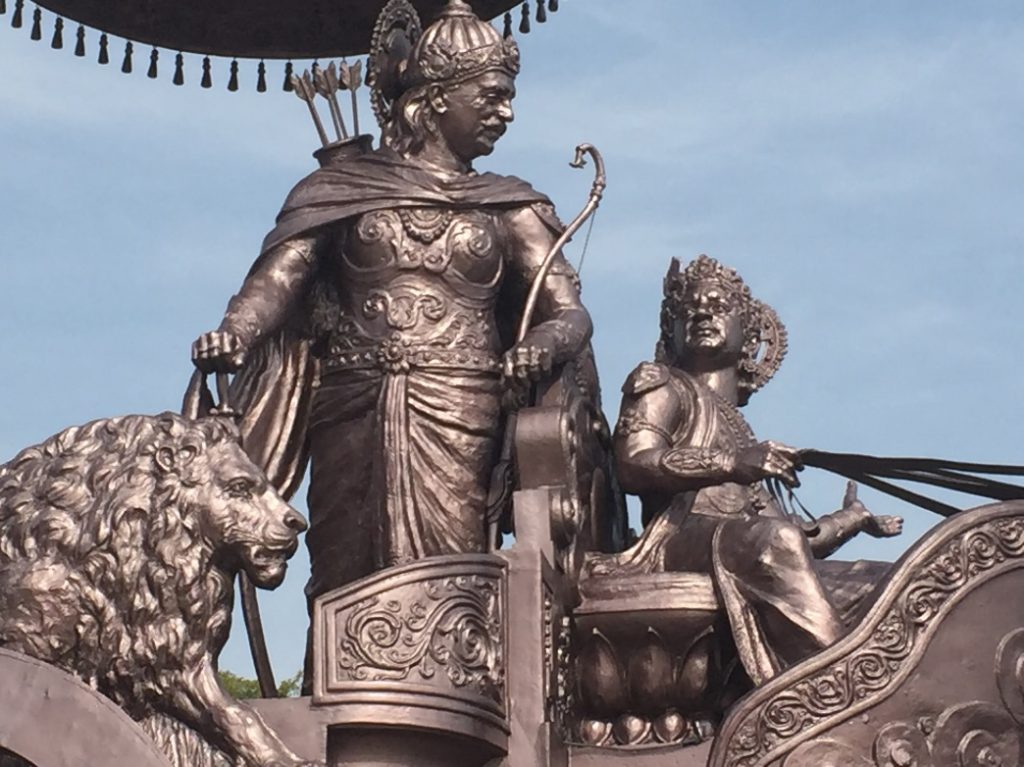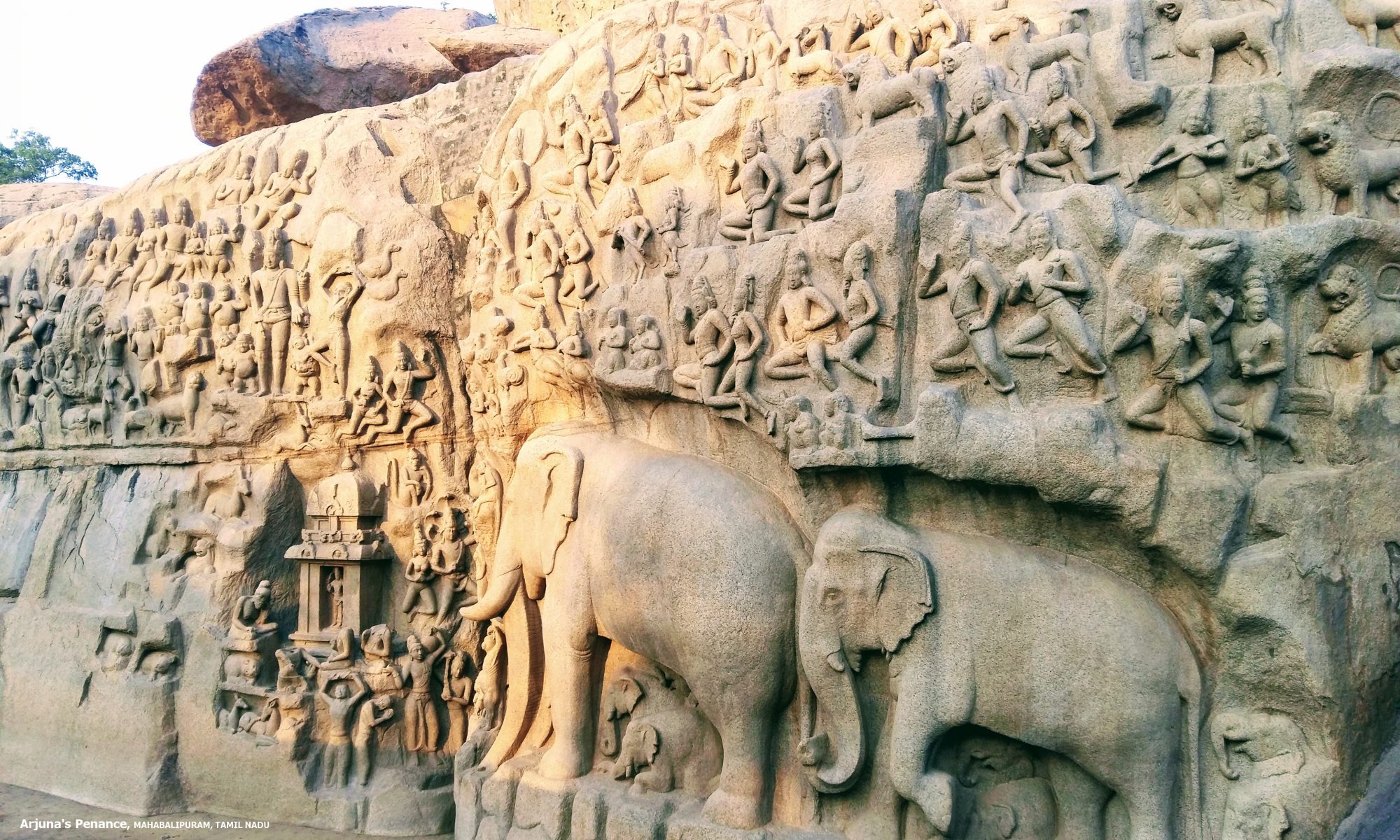Karma yoga, the path of right action for the good of all, is one of several Hindu spiritual paths covered in The Bhagavad Gita. The ultimate objective of all these paths is the same, deep realization that one’s soul (Atman) is the same as God or Absolute Reality (Brahman).
However, this blog’s specific task is to understand what the Bhagavad Gita has to say about Karma Yoga.
KRISHNA’S ADVICE TO ARJUNA

In my previous post, Introducing the Bhagavad Gita, we left Arjuna and Krishna in the middle of the great battlefield of Kurukshetra. The Pandava princes and their thousands of warriors are arrayed on one side. Their cousins, the Kaurava princes, stand on the other side with their thousands of warriors. All are poised to fight.
But Arjuna, leader of the Pandava warriors, does not want to fight. He knows his relatives, teachers, and friends on both sides will die. He asks Lord Krishna, who has taken the role of Arjuna’s chariot driver, for advice.

Within the Hindu epic, The Mahabharata, this interchange between Krishna and Arjuna is The Bhagavad Gita, or simply The Gita. Below are several verses selected to give you a glimpse of Karma Yoga and a taste of the wisdom of the Gita.
To understand the following verses, you need to know that within India’s ancient caste system, Arjuna was a ksatriya, a warrior, and his duty was to fight. You also need to know that within Hinduism, everyone is eventually saved, although it may take many lifetimes to achieve the needed perfection. Being saved is Moksha, the Union that comes from the deep realization that the inner self (Atman) is the same as the Godhead (Brahman).
Seven Translations of the Bhagavad Gita
For someone like me, who understands neither Sanskrit nor Hindi, I have to rely on translations, so I am sitting down with seven well regarded translations of The Bhagavad Gita. I have selected for comparison 10 verses that relate to Karma Yoga and Arjuna’s despair at fighting this war. With these 10 verses, I feel the basic message of the Bhagavad Gita is broght to light.
The ten chosen verses are: 2:30, 2:31. 2:47, 3:9, 3:20, 3:30, 11:32, 11:49, 11:50, and 11:51. My wish is that you take the time to read through them and contemplate the message the translators tease from the original Sandscrit texts.
Chapter 2: Verse 30 – The individual self-Atman is the same as universal Self or Reality Brahman. This verse explains that if you really understand this, then you know there is no death and no need for grief.
Click for Translated versions of verse 2:30
E.E. The self of all beings, living within the body, is eternal and cannot be harmed. Therefore, do not grieve.
G.F. This Self who dwells in the body is inviolable, forever: therefore you have no cause to grieve for any being, Arjuna.
M.G. This embodied one in the body of every being is ever beyond all harm, O Bharata; thou should not, therefore, grieve for anyone.
J.M. The Spirit that is in all beings is immortal in them all: for the death of what cannot die, cease thou to sorrow.
B.S.M. The self embodied in the body of every being is indestructible; you have no cause to grieve for all these creatures, Arjuna!
S.M. The Self who dwells in the body is inviolable, forever; therefore you have no cause to grieve for any being, Arjuna.
S.P. O descendant of Bharata, he who dwells in the body can never be slain. Therefore you need not grieve for any living being.
Chapter 2: Verse 31 – We all have a duty to perform right action. Arjuna is a warrior and his job is to fight a war against evil. The translators agree that the war at Kurukshetra is between good and evil.
Click for translated Versions of Verse 2:31
E.E. Considering your dharma, you should not vacillate. For a warrior, nothing is higher than a war against evil.
G.F. Know what your duty is and do it without hesitation. For a warrior, there is nothing better than a battle that duty enjoins.
M.G. There is no higher good for a Kshatriya than a righteous war.
J.M. Think thou also of thy duty and do not waver. There is no greater good for a warrior than to fight in a righteous war.
B.S.M. Look to your own duty; do not tremble before it; nothing is better for a warrior than a battle of sacred duty.
S.M. Know what your duty is and do it without hesitation. For a warrior, there is nothing better than a battle that duty enjoins.
S.P. Considering your specific duty as a ksatriya, you should know that there is no better engagement for you than fighting on religious principles; and so there is no need for hesitation.
Chapeter 2: Verse 47 – This verse is the basic statement of Karma Yoga: Do not work or act for reward.
Click for Translated versions of verse 2:47
E.E. You have the right to work, but never to the fruit of work. You should never engage in action for the sake of reward, nor should you long for inaction.
G.F. You have a right to your actions, but never to your actions’ fruits. Act for
M.G. Action alone is the province, never the fruits thereof; let not thy motive be the fruit of action, nor shouldst thou desire to avoid action.
J.M. Set thy heart upon thy work, but never on its reward. Work not for a reward; but never cease to do thy work.
B.S.M. Be intent on action, not on the fruits of action; avoid attraction to the fruits and attachment to inaction.
S.M. You have a right to your actions, but never to your actions’ fruits. Act for the action’s sake. And do not be attached to inaction.
S.P. You have a right to perform your prescribed duty, but you are not entitled to the fruits of action. Never consider yourself the cause of the results of your activities, and never be attached to not doing your duty.
Chapter 3: Verse 9 – In this verse, the Bhagavad Gita describes that one should not act for selfish motives.
Click for Translated versions of verse 3:9
E.E. Arjuna, you are obliged to act. Selfish action imprisons the world. Act selflessly, without any thought of personal profit.
G.F. The whole world becomes a slave to its own activity. Arjuna: if you want to be truly free, perform all actions as worship.
M.G. This world of men suffers bondage from all action save that which is done for the sake of sacrifice; to this end, O Kaunteya perform action without attachment.
J.M. The world is in the bonds of action, unless the action is consecration. Let thy actions then be pure, free from the bonds of desire.
B.S.M. Action imprisons the world unless it is done as sacrifice; freed from attachment, Arjuna, perform action as sacrifice.
S.M. The whole world becomes a slave to its own activity, Arjuna: if you want to be truly free, perform all actions as worship.
S.P. Work done as a sacrifice for Visnu has to be performed; otherwise work causes bondage in this material world. Therefore, O son of Kunti, perform your prescribed duties for His satisfaction, and in that way you will always remain free from bondage.
Chapter 3: Verse 20 – I like this verse because it reminds us that we must act with the welfare of others in mind.
Click for Translated versions of verse 3:20
E.E. Do your work with the welfare of others always in mind. It was by such work that Janaka attained perfection; others, too, have followed this path.
G.F. By action indeed Janaka and others attained consummation. Even considering only the world’s welfare, you ought to act.
M.G. For through action alone Janaka and others achieved perfection; even with a view to the guidance of mankind thou must act.
J.M. King Janaka and other warriors reached perfection by the path of action: let thy aim be the good of all, and then carry on thy task in life.
B.S.M. Janaka and other ancient kings attained perfection by action alone; seeing the way to preserve the world, you should act.
S.M. Only by selfless action did Janaka and other wise kings govern, and thus assure the well-being of the whole world.
S.P. Kings such as Janaka attained perfection solely by performance of prescribed duties. Therefore, just for the sake of educating the people in general, you should perform your work.
Chapter 3: Verse 30 – Krishna is saying you must act for My sake, completely absorbed in the Self. This is a high spiritual state. You are especially warned to watch out for the fever of ego.
Click for Translated versions of verse 3:30
E.E. Performing all actions for My sake, completely absorbed in the Self, and without expectations, fight! – but stay free from the fever of the ego.
G.F. Performing all actions for My sake, desireless, absorbed in the Self, indifferent to “I” and “mine,” let go of your grief and fight.
M.G. Cast all they acts on Me, with thy mind fixed on the indwelling Atman, and without any thought of fruit or sense of ‘mine’ shake off they fever and fight.
J.M. Offer to me all thy works and rest thy mind on the Supreme. Be free from vain hopes and selfish thoughts, and with inner peace fight thy fight.
B.S.M. Surrender all actions to Me, and fix your reason on your inner self; without hope or possessiveness, your fever subdued, fight the battle!
S.M. Performing all actions for My sake, desireless, absorbed in the Self, indifferent to “I” and “mine.” Let go of your grief and fight!
S.P. Therefore, O Arjuna, surrendering all your works unto Me, with full knowledge of Me, without desires for profit, with no claims to proprietorship, and free from lethargy, fight.
Chapter 11: Verse 32 – Here, Krishna reveals Himself as the Godhead, all will die, not only the warriors on both sides, but all of us. (This is the majority interpretation of the translators, but some say all the evil will die, the enemies of Arjuna)
Click for Translated versions of verse 11:32
E.E. I am Time, the destroyer of all; I have come to consume the world. Even without your participation, all the warriors gathered here will die.
G.F. I am death, shatterer of worlds, annihilating all things. These warriors in their facing armies will die.
M.G. Doom am I, full-ripe, dealing death to the worlds engaged in devouring mankind. Even without thy saving them, not one of the warriors, ranged for battle against thee, shall survive.
J.M. I am all-powerful Time which destroys all things, and I have come to slay these men. Even if thou dost not fight, all the warriors facing thee will die.
B.S.M. I am time grown old, creating world destruction, set in motion to annihilate the worlds; even without you, all these warriors arrayed in hostile ranks will cease to exist.
S.M. I am death, shatterer of worlds, annihilating all things. With or without you , these warriors in their facing armies will die.
S.P. The Supreme Personality of Godhead said: Time I am, the great destroyer of the worlds, and I have come here to destroy all people. With the exception of you (the Pandavas), all the soldiers here on both sides will be slain.
Chapter 11: Verse 49 – In this verse, Arjuna is told how to overcome his fear upon seeing Krishna as the Godhead in one of His most awesome and frightening aspects.
Click for Translated versions of verse 11:49
E.E. Do not be troubled: do not fear My terrible form. Let your heart be satisfied and your fears dispelled in looking at Me as I was before.
G.F. Do not be frightened or confused at seeing My horrific form. Free of fear, lighthearted, see me as I was before.
M.G. Be thou neither oppressed nor bewildered to look on this awful form of Mine. Banish they fear, ease they mind, and lo! Behold Me once again as I was.
J.M. Thou hast seen the tremendous form of my greatness, but fear not, and be not bewildered. Free from fear and with a glad heart see My friendly form again.
B.S.M. Do not tremble or suffer confusion from seeing My horrific form; your fear dispelled, your mind full of love, see My form again as it was.
S.M. Do not be frightened or confused at seeing My horrific form. Free of fear, lighthearted, see Me as I was before.
S.P. You have been perturbed and bewildered by seeing this horrible feature of Mine. Now let it be finished. My devotee, be free again from all disturbances. With a peaceful mind you can now see the form you desire (Krishna)
Chapter 11: Verse 50 – Krishna resumes his human form as a gentle councelor.
Click for Translated versions of verse 11:50
E.E. Having spoken these words, the Lord once again assumed the gentle form of Krishna and consoled his devotee, who had been so afraid. (Sanjaya, narrator)
G.F. Having spoken thus to Arjuna, the Lord stood before him again in the mild and pleasant form of Krishna, the kind, the beautiful. (Sanjaya, the narrator)
M.G. Seeing His four-armed form and then again His more gentle two-armed visage, Arjuna’s tranquility is restored and he becomes composed (Sanjaya, the narrator)
J.M. Thus spoke Vasudeva (Krishna) to Arjuna, and revealed himself in his human form. The God of all gave peace to his fears and showed Himself in His peaceful beauty. (Sanjaya, narrator)
B.S.M. Saying this to Arjuna, Krishna once more revealed His intimate form; resuming His gentle body, the great spirit let the terrified hero regain his breath. (Sanjaya, narrator)
S.M. Having spoken thus to Arjuna, the Lord stood before him again in the mild and pleasant form of Krishna, the kind, the beautiful. (Sanjaya, narrator)
S.P. Sanjaya said . . .: The Supreme Personality of Godhead, Krishna, having spoken thus to Arjuna, displayed His real four-armed form and at last showed His two-armed form, thus encouraging the fearful Arjuna.
Chapter 11: Verse 51 – Seeing Krishna in his human form enables Arjuna to again feel peace.
Click for Translated versions of verse 11:51
E.E. O Krishna, now that I have seen Your gentle human form my mind is again composed and returned to normal. (Arjuna)
G.F. Seeing Your human form, Krishna, I feel at ease: and more I am myself, and my mind has regained its composure.
M.G. Beholding again Thy benign human form I am come to myself and am once more in my normal state. (Arjuna)
J.M. When I see Thy gentle human face, Krishna, I return to my own nature, and my heart has peace. (Arjuna)
B.S.M. Seeing Your gentle human form, Krishna, I recover my own nature, and my reason is restored.
S.M. Seeing Your human form, Krishna, I feel at ease: once more I am myself, and my mind has regained its composure.
S.P. . . .O Janardana (Krishna), seeing this humanlike form, so very beautiful, I am now composed in mind, and I am restored to my original nature. (Arjuna)
TWO IMPORTANT QUESTIONS:
1. WAS THIS WAR AT KURUKSHETRA A RIGHTEOUS WAR? Verse 2:31
All of the translators agree that fighting this war was either righteous, against evil, a duty, or based on religious principles.
However, if you watch Peter Brook’s movie of the Mahabharata on YouTube, you will see that the Kaurava leader Duryodana, plotted a crooked dice game to win the throne. On the other side, the eldest Pandava, Yudhisthira, addicted to gambling but not very good at it, agreed to the game and lost the throne (as well as himself, his wife, and the four other Pandavas). Things are never really simple.
2. WHAT ABOUT THE OUTCOME OF THE WAR? Verse 11:32
All translators agree that Krishna as God enacts death and destruction. It is not Evil, it is not the work of Satan.
However, the translators disagree over who will die in the Kurukshetra War. Ghandi and Mascaro say it is the soldiers on the evil Kaurava side that will all die.
Prabhupada says all BUT the Pandavas will die. The Pandavas are the five brothers who marshalled thousands of warriors to fight against their cousins, the Kauravas. Thus Prabhupada implies that only the five Pandava brothers survived, not all the soldiers they recruited. Is that fair?
The other four translators say that all the soldiers will die, broadening the tolls of death beyond the “bad” Kauravas. (Easwaran, Feuerstein, Miller, and Mitchell).
We can blame the different perspectives on interpretations by the translators and/or the manuscripts they chose for translation.
BUT WHY ARE THESE DISTINCTIONS INTERESTING?
If only the bad Kauravas die, this story is not much different from many other moral tales that teach the bad will be punished.
However, the idea that all warriors on both sides die brings the question of reward and punishment, good and evil, to wider field. We all die.
My next post explores the question of Evil and Hinduism’s Law of Karma. What does Hinduism say is the natural outcome of negative thoughts and actions? Who is to blame when bad things happen to you?


